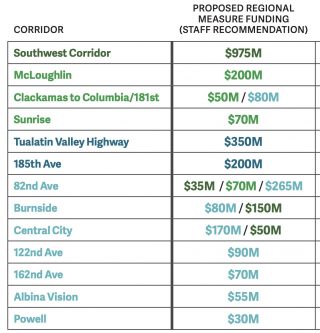
(Photo: J. Maus/BikePortland)
“What I think is remarkable is the amount of community consensus around 90% or so of the projects.”
— Andy Shaw, Metro
After nearly a year of public meetings the Metro 2020 Transportation Funding Task Force, a group of 35 community leaders and stakeholders appointed by Metro Council President Lynn Peterson, held several votes Wednesday night on what to include in the spending measure that could inject billions into the region’s transportation system.
At the end of a three-hour public meeting in a Clackamas County Community College community room last week, the most significant vote had resulted in a recommendation for Metro Council to include the Tier 1 corridor projects as part of the package. The package will go to the ballot in November 2020.
The Tier 1 corridors represent the most ideal locations for targeted transportation investments in the region, and they include significant high-volume and well-worn roadways like Burnside Street, 82nd Avenue, the Tualatin Valley Highway, SE Powell, and SE McLoughlin.
To help Metro meet equity, safety, climate action, and other goals for these corridors, the recommendations would result in improvements to active transportation facilities. These improvements could take the form of 40-45 miles of new sidewalks, 130-140 miles of improved bike lanes, and 280 marked crossings for cyclists and pedestrians. According to the meeting’s presentation, 56% of the proposed investments are transit related, 38% are safety related, and 79% are in “Equity Focus Areas” that are concentrated in east Portland and the Beaverton/Hillsboro area.
This vote, which passed unanimously, had been in the works since February and several of those present on Wednesday were feeling a little worn out before the 3-hour session started.
According to Richa Poudyal, Advocacy Director at the active transportation advocate group The Street Trust, “people were feeling tired, not just because of that night, but (also) because of all the work that has gone into the analysis of these projects.” That being said, Poudyal left feeling like there had been “really strong” wins for transit and for avoiding “disastrous investment” in Clackamas County.
Advertisement
Nolan Lienhart, Principal and Director of Planning and Urban Design at ZGF and a member of the task force, noted that the year-long build-up to this vote had left some feeling “frustrated that the process was long, at times complicated or a little unclear,” but he commended the staff at Metro “for trying to organize (the process) in the clearest way possible, provide as much information about the different projects and their impacts and benefits as they could.”

(Source: Metro)
Despite the long process, several people who were present at the vote felt it came to a positive conclusion. Metro’s Director Government Affairs Andy Shaw said Metro was “very pleased with the results” produced by the task force, adding “what I think is remarkable is the amount of community consensus around 90% or so of the projects, and also the really civil, positive discussions that the task force was able to have.”
On whether this process should serve as a model for future, similar Metro task forces, Andy felt the votes demonstrated that “we can bring together really diverse points of view and people from different places… and we can have a process of dialogue, understanding, prioritization, and decision-making.”
While the Tier 1 corridor vote represented the biggest collection of projects, the task force also voted on and discussed several other projects and amendments.
One of the larger discussions was whether include roadway improvements to the NE Airport Way/NE 82nd intersection in the recommendations. While the task force initially decided not to recommend the improvements, which included constructing an overpass for traffic leaving the airport, a compromise was made with the Port of Portland, which operates PDX. The task force voted to recommend funding Airport Way corridor improvements under the condition that the Port of Portland would commit resources to the planning and design of a multi-use path along Alderwood/Killingsworth.

A third vote was on the Highway 212 corridor, which has struggled with congestion and network connectivity problems. Opponents of the proposal, including The Street Trust, pointed out that funding the whole project would not be a bold enough stance for climate action, as the proposal included improvements that would benefit single-occupancy vehicles. Many Task Force members recognize that failing to take a bold stance on this issue could result in a failure at the ballot box.
As a result, the task force voted against recommending funding for all of the proposed projects along Highway 212, but it did vote to include the Safety and Local Connections Project, which emphasizes multi-modal improvements. The task force approved $130 million for these projects with an additional $50 million for planning, which Poudyal described as a win for The Street Trust.
Metro Council will decide what to do with these recommendations after hosting an open house on January 13th. According to Lienhart, one result of Wednesday’s vote “was the recognition (among those present) that it is important that we begin to start looking to enact (the projects)… rather than debating the last ten percent of projects that not everyone is going to get behind.”
As Andy puts it, “the next big step is to continue looking at revenue sources and the options for how to actually pay for (these projects).”
The council will eventually develop a package that it will present to the public for a bond measure vote in 2020.
— Henry Miller, henryltmiller@gmail.com
— Get our headlines delivered to your inbox.
— Support this independent community media outlet with a one-time contribution or monthly subscription.

